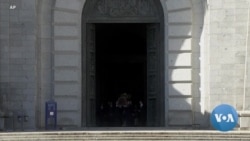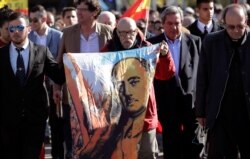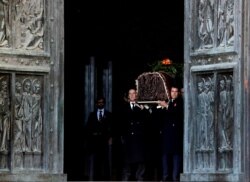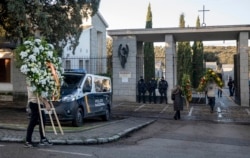LONDON — The body of former Spanish dictator General Francisco Franco was exhumed from its grandiose mausoleum outside Madrid Thursday, the culmination of a decades-long campaign to end what many saw as the glorification of the 20th century dictator.
The coffin was dug up from beneath marble slabs and two tons of granite, where it had lain for 44 years since Franco’s death in 1975. It was carried by family members and taken away by helicopter to a cemetery outside the capital, where it was reburied next to the grave of his wife.
The move marks the latest chapter in Spain’s struggle to reconcile its dark past. General Franco led Spain from 1939 after defeating Republican forces in a civil war, until his death. It’s estimated that more than 100,000 political opponents were killed under his dictatorship.
Celebrations were held in the capital and several other Spanish cities following the exhumation; however, hundreds of Franco supporters protested the decision outside the cemetery where his body now lies.
The former gravesite in the "Valley of the Fallen" was built by prison laborers under the dictatorship. Among them was Nicolas Sanchez-Albornoz, who was jailed under the Franco regime for his political campaigning. The 93-year-old welcomed the exhumation.
"It was time (to move him). We've waited many decades for [Franco] to disappear from this monument - which in and of itself was the shame of Spain,” Sanchez-Albornoz said.
The Supreme Court authorized the exhumation in September. Pedro Sánchez, Spain’s acting prime minister, had led government efforts to seek judicial approval.
“With this decision we have ended a moral outrage: the homage to a dictator in a public space,” Sanchez said Thursday.
The battle over Spain’s past has not ended, however. Hundreds of Franco supporters protested the exhumation, cheering the Franco family as they arrived at the cemetery. Some gave fascist salutes.
“We cannot remain inactive while the government is trying to force its history on us and tell us what to think about who are the good guys and who are the bad,” said Franco supporter Jorge Alvarez.
Spain has for too long tolerated such opinion, argues historian Pau Casanellas of the Center for Study of Francoism and Democracy at the Autonomous University of Barcelona.
“The voices that vindicate the dictatorial past should not have a place in the public debate,” he said.
Spain faces a general election next month. Critics say the Socialist government’s push to press ahead with the exhumation smacks of electioneering.
“While we must be in favor of it, I believe this measure no doubt has an electoral character. It was approved by the government of Pedro Sanchez at the beginning of 2019 and accelerated now with great hurry because we are in the electoral period,” says Casanellas.
The exhumation comes at a tense time in Spanish politics. Catalonia’s push for independence has once again triggered violent protests following the jailing of the movement’s leaders. Catalonia was the final stronghold of Republican forces who fought Franco in the civil war.
Spain’s government hopes the exhumation of the former dictator will bring closure to a painful chapter in its history. Others fear digging up the past will only bring further trouble.








